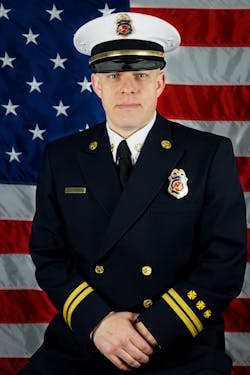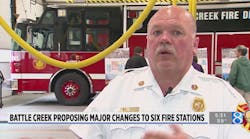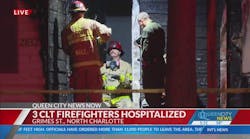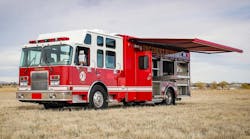“Serve and take care of those who serve.” Although that may seem like a simple concept, it can be a very complex and challenging task.
Two years ago, in Contra Costa County (CoCo), CA, east of San Francisco, peer supporters, critical incident stress management (CISM) teams, mental health professionals, and chaplains from all branches of public safety saw an opportunity—a need—to develop consistent policies, training and, most important, a collaborative psychological/spiritual mutual-aid system. Our shared mission is to help emergency responders, responder spouses, dispatchers and retirees, and to support team peer support members with the all-too-familiar challenges of compassion fatigue.
To accomplish this mission, a diverse group of public safety responders formed the Contra Costa County Public Safety Support Services Association (CCCPSSSA). Our geographic coverage area includes 14 fire agencies, 26 law enforcement agencies and three medical response providers. Our primary goal is to ensure consistent team responses and to learn from each organization’s best practices for peer-to-peer and group interventions and support.
The spirit of the association is to support the individual agencies. If one agency is overwhelmed after a critical incident or from cumulative stress, we assign team members to come alongside organizations to handle situations at the lowest level possible (agency team before county team).
One of the hardest foundation-building tasks was to define how the Association would be endorsed and receive formal authority throughout the County. To accomplish this, we needed to be supported and endorsed by the Contra Costa County Executive Fire Chiefs Association, which includes all 14 fire chiefs in the county. The Executive Fire Chiefs coordinate and provide oversight for all County Chief's Association subcommittees: Operations Chiefs, Training Chiefs, EMS Chiefs. Now they also do so for the CCCPSSSA.
Operations
From 2015 to 2017, CCCPSSSA members developed an Operations Manual that provides protocols and recommended training standards for its member agencies. The Operations Manual has become our guiding document.
Reaching agreement on priorities and operations is critical for any interagency initiative to stay focused and avoid misunderstandings. Our leaders allowed plenty of time to gather suggestions and feedback from as many stakeholders as possible. That effort didn’t end with the Association’s launch. We are committed to learning along the way, updating and maintaining the Operations Manual to fit member agencies’ needs.
We did not start from zero. Members gathered and reviewed relevant policy and procedure manuals from our own agencies and others, through networking and Internet searches. Although we were breaking new ground—nothing exactly like the Association existed—knowing what was working in other areas helped guide our planning and reduced our risk.
Activity
Although the Association is just becoming active, we are already inspiring and coaching nearby counties that also see the need for interoperability and consistent peer, CISM, clinician and chaplain training, standards, operations and response procedures for psychological/spiritual mutual aid.
The Association became operational in January 2017 and now meets monthly. As we grow, our membership is drawing active and retired fire, EMS and law enforcement personnel, along with chaplains and “culturally competent” clinicians—therapists who are either former public safety personnel or who have had experience and training to prepare them to care for first responders.
Launching something new is hard; keeping it going can be just as challenging. We knew that maintaining a high-quality program begins with the people who comprise it. By policy, all prospective members must be approved by one of our Peer Review Committees—CISM, chaplain or clinician. We chose highly experienced and respected people to make up these groups, which review candidates for peer support/CISM, chaplains or mental health roles. They ensure that the candidates have met our training requirements and either have an appropriate public safety background or other experience that makes them “culturally competent” to interact with public safety personnel. We also developed application forms and interview policies that were distributed, reviewed and revised along with the Operations Manual.
For our member agencies, we make recommendations, but do not seek to control their requirements, policies or procedures. We exist to support them, so we developed a set of recommendations for minimum training for peer support or CISM team membership. The Association also provides sample standard operating procedures (SOPs), handouts and other resources on its website, cccpsss.com.
Today, when a critical incident impacts a CoCo agency, and it determines that its needs exceed its internal resources, it can now obtain mutual aid with a single call, following a protocol defined in the Operations Manual. The on-duty association coordinator will assign and deploy appropriate and vetted peer support, CISM teams, chaplains and/or mental health professionals as needed to support the agency.
To ensure and maintain integrity, we saw the need to identify circumstances or actions that would call for suspension or removal of a member. If such circumstances arise, a Peer Review Board—two team members and a mental health professional—can make recommendations to the Association’s program coordinator, who initiates disciplinary action. Actions that could lead to discipline include breaches of confidentiality or protocols, self-deploying, failing to keep team commitments, or other behavior that is contrary to the Association’s mission, policies and procedures.
We are not limiting ourselves to supporting responders. We have also added classes for their spouses, families and significant others. We know that this work can be hard on families, but we also know that family can be one of the greatest sources of support.
Training
Excellent training is essential to delivering quality services, so we partner with and host training by regional, state and national organizations:
- CrisisResponse.org, a service of the Christian radio network K-Love, provides free crisis intervention training classes, primarily to first responders, throughout the United States. The classes are taught by Approved Instructors from the International Critical Incident Stress Foundation (ICISF).
- ICISF sets standards and develops curriculum for crisis intervention. The Association requires members to have completed the ICISF’s individual and advanced group crisis intervention as well as “Suicide Prevention, Intervention and Postvention.” Members who will provide mutual aid outside of Contra Costa County must meet additional training requirements.
- The California Fire Chaplain Association is a nonprofit that provides basic and advanced training for fire chaplains.
- The 10-33 Foundation focuses on equipping and strengthening first responders, military personnel and their families. It has partnered to host and lead education for responders and spouses.
- The Association participates in the Firefighter Behavioral Health Association’s "We Remember” event (FFBHA.org).
Our training requirements, which we also recommend to our member agencies for their own support teams, include required and recommended classes.
Required classes to respond within the county:
- Introduction—roles and responsibilities, processes and protocols
- Cross Exposure Training for mental health professionals who have never been first responders includes ride-alongs and other ways to help clinicians become familiar with the setting and cultures
- ICISF Assisting Individuals in Crisis
- ICISF Group Crisis Intervention
- ICISF Suicide Prevention, Intervention and Postvention
- ICISF Advanced Group Crisis Intervention
Requirements for mutual-aid response outside of the county are the same as above, plus:
- ICISF Stress Management for the Trauma Services Provider
- ICISF Line of Duty Death: Preparing the Best for the Worst
- ICISF Techniques for Delivering Bad News by Crisis Response Personnel
- Strategic Response to Crisis
- Psychological First Aid
Recommended for member agencies:
- ICISF Individual and Group Crisis Intervention or Assisting Individuals in Crisis and Group Intervention.
- ICISF Suicide Prevention, Intervention and Postvention
What’s ahead
We are looking beyond our borders by developing mutual-aid protocols with neighboring counties. We have also begun to explore the possibility of routinely assigning a CISM position to our regional and state Incident Management Teams. This would ensure that during large incidents, CISM services will be readily available.
The goal is to serve and to take care of those who serve. By sharing our journey and our findings, the CCCPSSSA hopes that our resources will help other agencies by enhancing interoperability and developing a collaborative psychological/spiritual mutual-aid system. Please visit cccpsss.com for additional information and resources.






